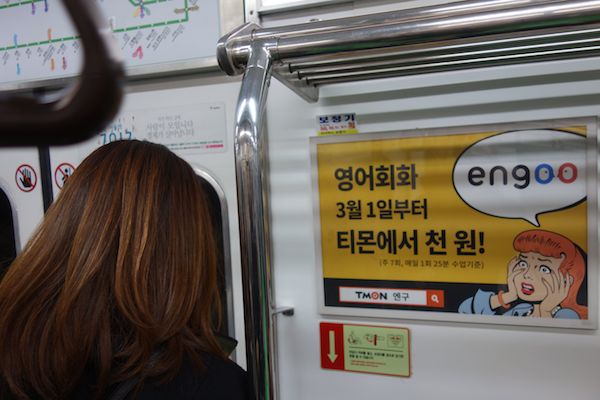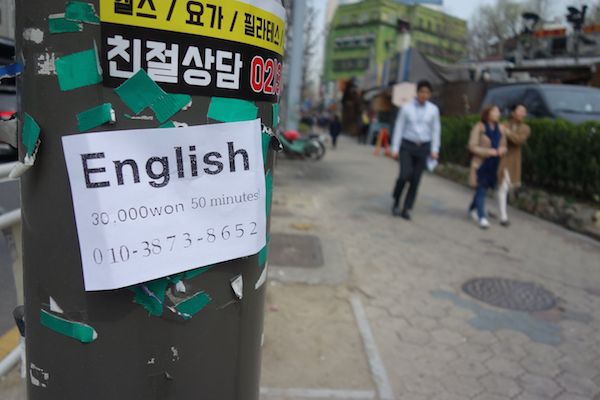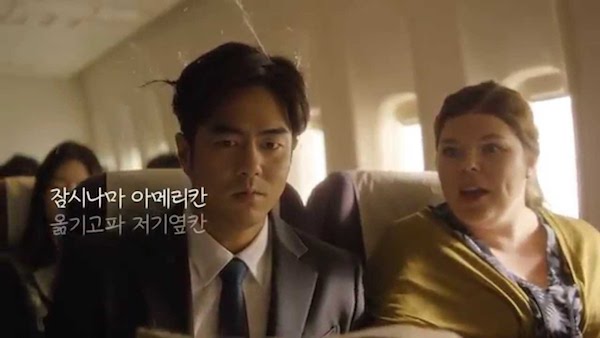A young Korean lady walks down the street, textbooks in her arms and earbuds in her ears. Suddenly, a plaid-shirted, down-vested white guy walks up to her: “Hi, excuse me, I need directions to Gangnam Station?” Sweat streams down the girl’s face. A Korean fellow in a suit picks up a newspaper and takes his seat on an airplane. Suddenly, the middle-America-looking lady seated next to him reaches over and points at the page he’s opened: “Hey, I was reading that article, and…” Sweat sprays in all directions from the top of his head. In a school library, in a cafe, other Koreans mind their own business on their computers, and still more Westerners suddenly approach: “Hello? Excuse me? You speak English, right?” “Hi, I’m so sorry to interrupt…” Further torrents of sweat pour forth.
I chuckled at this series of television commercials for an English-assistance smartphone app called Speakingmax the first time they came on, but it’s fair to say they’d grown less funny by the twentieth. The repetition of these ads (and their strange jingle-adaptation of Anita Ward’s “Ring My Bell”, of all songs) bothers me less than their underlying assumptions, more clearly visible with each viewing. Why on Earth do all these Westerners assume they can approach a stranger in a foreign country — a country with its own language — and simply begin yammering in English? And why do these Koreans feel so obligated to respond in English, and so unable to respond in English, as to induce such a violent endocrine reaction?
Each of these Speakingmax commercials carefully sets up a they-asked-for-it scenario, going so far as to spell out on the screen what flame they’d inadvertently held out to the foreign moth: he could see her English textbooks, she saw him reading an English-language newspaper, she saw him studying for some high-profile English exam like the TOEIC or TOEFL, he saw English-language news on her laptop screen. So sure, the Westerners all had some reason to believe that these particular Koreans could speak at least a little English, but not to at least try to open the conversation in Korean — much less to launch into it in full-speed English — strikes me as inexcusable. And given all the foreign actors’ bland accents, it also offers evidence that the “ugly American” stereotype (no matter how much more boorish other countries’ tourists have become) remains alive and well.
These spots also vividly dramatize the extent to which fear and even shame figure in to the culture of English in South Korea. Ads play on these emotions not just on the airwaves but also down in the subway: the text of poster below, just up and to the left of the terrorized-looking cartoon lady, offers English practice sessions for 1000 won each (a low enough price that it must involve outsourcing to a call center in the Philippines, the destination of choice for Koreans looking to study English abroad on a budget). I saw another one more recently that addressed itself to “you who studied English for ten years but cannot speak English for ten seconds,” tapping into the nation’s painfully wide gap between the huge amounts of time and money put into English education and the fluency so rarely achieved.
Most young Korean adults really have had to study English for that long, and so it dismays them when they travel to an English-speaking country — or, in Speakingmax’s Korea, suffer a linguistic attack by a wayward American on their own soil — and find themselves understanding so little and able to say even less. But to me it makes perfect sense, as it would to any American who had to grind through French or Spanish requirements in high school: English is a foreign language, and you can’t actually learn a foreign language in a classroom, especially without any special inclination toward that language. I myself had to start Spanish classes from age nine and continue them until college, during which time I learned, and expected to learn, almost nothing of use in actual Spanish-language conversation. But when I discovered an interest in Spanish-speaking countries later, in my twenties, I taught (or re-taught) myself the basics I needed in hardly any time at all.
So why does every South Korean student have to spend so much of their time studying not just a foreign language, but specifically English, and why hasn’t it had the ostensibly desired results? “The whole time I’ve been here, Korea has continued to spend the most money on English education in the entire world,” says Michael Elliott, who runs the video and podcast enterprise English in Korean, which he started after years working as a translator. “The impetus for me to start venturing into education was when I was translating two articles: one was that Korea spends the most money on English education, and the next was that businesspeople who did business in Asia rated the ease of communication in all these different nations, and Korea was dead last. It was obvious that something wasn’t going well here.”
“I didn’t start studying Korean until I was an adult,” says Elliott. “I think expression, building a vocabulary in your own language, is much more important, and then you understand that there are these modes of expression, that this vocabulary exists, and then you use that. When you speak English with somebody who’s older in America, and they use a lot of idiomatic expressions, they use proverbs — it’s beautiful. First you have to know that that mode of expression exists, and then later you’ll have the desire to replicate that in a foreign language. But if you never even get that deep into your own language, everything is so rudimentary. A lot of Korean kids start learning English to the detriment of their Korean, and that’s topsy-turvy.”
The starting age of English classes in Korea, whether at public schools or private institutes, has fallen lower and lower with time. The currently fashion holds that if you don’t get your child studying English while still a toddler, they’ll never make it in this world. And not just studying English, but developing what passes for a native English speaker’s accent and manner. Speakingmax’s commercials may have made me laugh before they got me worrying, but those aired by English Egg, a producer of childhood English-study materials, chilled me from the first. “Mommy, look at me,” shouts a little girl, holding up her sketchbook, “I can paint a tree!” The mother smiles benevolently. Then daughter rises and scampers forth, arms waving: “I love bread and milk!” (The writers can hardly have chosen those characteristically Western foods by chance.) I turn in disbelief from this spectacle to Korean friends and ask, “This… this is weird, right?”
But as students themselves, their own immediate goals had less to do with becoming bread-eating, milk-drinking, English-speaking quasi-Westerners than with scoring highly on the standardized English tests they perceived as deciding so much of their future. None looms quite so large as the English section of the College Scholastic Ability Test (대학수학능력시험), known as the Suneung, an exam that acts in most ways the Korean equivalent of the SAT, descended from old Confucian standardized-test culture, carries much more weight and thus does much more affect the shape of society. (To see that in grim action, watch the documentary Reach for the SKY.)
As the only subject that generates enough of a standard deviation in scores to sort students into the strict hierarchy of Korean universities, English has become the wall in front of a respectable Suneung result, and thus in front of a respectable university, and thus a respectable career, and ultimately a respectable life. Still, “if you learn English properly,” says Elliott, “the test comes naturally, but if you learn test English, you’re left with nothing.” Yet many Korean students gladly make that tradeoff, living as they do in a society where “English is perceived as tool, or a path, to making more money.”
“That’s why a lot of Koreans are perplexed when they see us studying Korean. I went to Thailand once: things were cheap, the people were friendly, the food there is really good. I came back here and wanted to try my hand at Thai. I asked Korean friends and they’d just say, ‘Oh, there’s not going to be any institutes that teach that.’ I asked why, and they said, ‘Well, because it’s a poor country.’” North Korea analyst Brian Reynolds Myers, who teaches in the department of international studies at Dongseo University, describes this phenomenon as “something that frustrates me,” since “we’re trying to make the students realize just how important China and India and Russia and Brazil are going to be to their own futures.”
“I’m constantly telling them to learn Indonesian, which I think is the ‘golden tip.’ Indonesian is a very easy language to learn: they don’t have a particularly developed past tense and they don’t make a big fuss about plurals and so on, which is right up the Koreans’ alley, you would think. And yet they all are learning English and Chinese in the hope that that’s going to distinguish them on the job market.” They do it because “they look at the outside world in terms of an economic hierarchy. If I have a student from the United States who gets up and talks about his hometown, they’re all ears. And yet when a Russian stands up and talks, or an Egyptian, or a Kyrgyz, I can tell that the attention level drops markedly, which is unfortunate and short-sighted.”
If I had my way, I’d remove English from the Suneung forever, replacing it with some other equally arbitrary and arduous task (memorizing the digits of pi, say) and leaving the study of foreign languages to the few students with genuine affinities for the cultures that produced them — whether Russia, Egypt, Kyrgyzstan, Indonesia, Thailand, or indeed England or America — and thus the only ones who can really excel at it. As the Wall Street Journal‘s Jasper Kim put it in his diagnosis of Korea’s “English fever,” perhaps the country “should focus on less (not more) English education for most of its students — continuing ‘extreme English’ only for those who will need it on a regular basis for their future global career trajectory. This would free up not just capital, but millions of South Korean young minds to learn the skill-sets that most interest and fit their individual talents.”
On the whole and for a variety of reasons, I like Korea more than Japan. But whenever I cross the East Sea — or the Sea of Japan, or call it what you will — I feel a wave of relief upon entering a country where everyone speaks to you in the language of the country where you are. Japan has certainly enjoyed its flirtation with English: the country nearly converted to it wholesale as an official language at one point in its history, and longtime expats over there tell me that, 25 years ago, a Westerner couldn’t go out to a Tokyo bar without running into a tipsy salaryman aggressively eager for practice. But it appears that Japanese society has finally settled on just speaking Japanese, complemented by what David Sedaris, a frequent visitor to Japan and casual student of the Japanese language, tends to call “seventeen words of English.”
It’s not as if Japan expects foreigners to have perfect Japanese — far from it, and in fact the oft-satirized attitudes there suggest that many native speakers consider us, against all evidence, innately unable to learn it to a high level. But still, approach a Japanese person in Japan, and they’ll expect you, and I would say rightly expect you, to at least start off speaking in Japanese. Even if you do speak in English, they’ll like as not offer you Japanese in reply. Korea affords no such linguistic security: I still tense up, slightly, when I speak Korean even to just the barista at a coffee shop, not knowing whether to expect a response in Korean, in unbidden English (against which I’ll feign incomprehension and stonewall as long as it takes), or, worst of all, in a confusing mishmash of both, the Korean sentences mined with scattered, unrecognizable “English” terms.
Still, Korean English education as we know it has chugged along despite discomfiting side effects: for the Koreans, the impossibly widespread psychological burden of mastering a completely alien tongue, and for the Westerners, a community-discoloring preponderance of English teachers, many of whom arrive with scant interest or investment in Korea, much less in the Korean language — or, according to the not-entirely-false stereotype, in anything more than a few years of easy paychecks. (Half the time I introduce myself to a Korean, they ask not what I do, but whether I teach English.) One might argue that English’s standing as “the international language” justifies all this, but I don’t quite buy it, partly because of its inherent unsuitability to quick acquisition and unambiguous intercultural communication, but more so because I’d rather struggle with a foreign language myself than hear my native one get stripped of its nuance across the world.
That aside, the expectation that all Koreans should speak English, and that no non-Koreans speak Korean, does more than its part to discourage the study of an already difficult language. Ironically, foreigners might well have an easier time of it if Korea subjected us to a Japanese-style (or stiffer still, Chinese-style) expectation of, over time, at least a certain level of conversational proficiency. It would certainly better suit the kind of strong country South Korea has become, strong enough to attract outsiders willing to learn its language rather than fall all over itself to learn a language of the outsiders. In an article on Korea’s thus far unfilfilled aspiration for a Nobel Prize in Literature, the New Yorker‘s Mythli G. Rao quoted a Korean “literature enthusiast” as saying that “I think the Nobel committee needs to learn Korean first.” Some readers laughed at that, but I can’t say I totally disagree.
Japan’s English education industry has never really recovered from the 2007 collapse of Nova, the country’s largest private English education company, which fell under the weight of financial losses, lawsuits, strikes, and even deaths. Korea’s English education industry has recently shown its own signs of strain, from sketchy dealings in Seoul’s struggling “English villages” to the suicide of the CEO of the even more troubled Wall Street English, one of the country’s most visible chains of private English schools. Whether this will lead to a break in South Korea’s English fever remains to be seen, but for now I propose re-naming the malady so as to reflect its more malignant, invasive, and wasting nature — a deeper and more complicated disorder, in other words, that nobody can just sweat out.
You can read more of the Korea Blog here and follow Colin Marshall at his web site, on Twitter @colinmarshall, or on Facebook.





